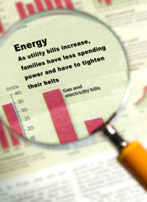Read more Oily Rag articles by Frank and Muriel Newman
With the emissions trading scheme now forcing up power prices, we thought it timely to remind readers about the many ways to save electricity costs. Fortunately, lots of people and organisations like power companies are advocating ways to save electricity so there is no shortage of ideas. Here are some tips from readers.
Tex from Christchurch says, “I save power by using a small fan forced bench top cooker instead of the big oven. I can cook a roast meal for 4 much more economically by not heating up that massive oven most of us have in our kitchens. The small bench top oven heats faster using less power too. Slow cookers also are a great way to cook a lot of food at once inexpensively.”
 When buying new appliances, look out for the star rating sticker. This shows how much energy (in kWh hours) the appliance uses in a year. From this it is easy to calculate the annual energy cost. For example, if the sticker says 433 kWh, and energy costs say 23 cents a kWh (check your last power bill to see how much you are paying), then the annual costs will be $99.60 a year (433 x $0.23). Most appliances have a ten-year life so the life-time cost would be $996, which may be as much or more than the purchase price and should be taken into account when buying appliances.
When buying new appliances, look out for the star rating sticker. This shows how much energy (in kWh hours) the appliance uses in a year. From this it is easy to calculate the annual energy cost. For example, if the sticker says 433 kWh, and energy costs say 23 cents a kWh (check your last power bill to see how much you are paying), then the annual costs will be $99.60 a year (433 x $0.23). Most appliances have a ten-year life so the life-time cost would be $996, which may be as much or more than the purchase price and should be taken into account when buying appliances.
A freezer is most energy efficient at between -15 and -18 degrees. Keep your fridge between 2 and 4 degrees. It is most energy efficient at that level. Fridges and freezers use less electricity when full.
Hot water accounts for at least a third of your power bill. Frugalite from Hamilton says, “I found that if I turn on my hot water at night when I go to bed, and turn it off in the morning when I get up (about 7am) I saved about $80 on my power bill each month!”
SLC from Auckland says, “I'm a single person household. So I found out years ago I could save money by only having the hot water cylinder on for 1 hour per day. This is not enough to heat the entire cylinder to the thermostat temperature but is hot enough to shower with, wash hands, etc. The dishwasher and washing machine only use cold which they heat to the required temp so they are not affected.”
M.M says, “I take my children swimming once every week and we all wash our hair using the showers at the pools. Very rarely do we have to wash our hair at home and they never make a fuss of it like they do at home either. When I was working (before children) I always made use of the shower facilities at work and hardly ever had to shower at home!”
Tom says, “The best power saving tip for me was, rather than charging working kids board, to give them one of the bills to pay (power or petrol would be my pick).”
A reader from Northland says, “I recently became aware of PowerSwitch. It took me a couple of minutes to see that by switching to another supplier I could cut my electricity bill by about $900 a year. It’s a big saving because we are big electricity users, but it’s better in our pocket than theirs!" The Powerswitch site can be found at powerswitch.co.n.
Trustpower.co.nz has a list of the ten worst power wasters. Number one on their list is homes without insulation. Number two is hot water. They say if the hot water is more than 55°C at the tap, it is too hot, and will be wasting power. If you have a consumer adjustable thermostat on your hot water cylinder it should be set at around 60°C. They also have a list of 33 Ways to Save Power that’s well worth a look.
Energyonline.co.nz has a nice list of items that can be used like a checklist throughout the house.
You can contract Frank and Muriel Newman via the oily rag website (www.oilyrag.co.nz) or by writing to Living off the Smell of an Oily Rag, PO Box 984, Whangarei.
* Frank and Muriel Newman are the authors of Living off the Smell of an Oily Rag in NZ. Readers can submit their oily rag tips on-line at www.oilyrag.co.nz. The book is available from bookstores and online at www.oilyrag.co.nz.










Katybug - 16 years ago
Thank you for the tip re working children paying the bill- what a sensible way to teach responsibility and the consequences of your actions.Brilliant!
re living of the smell of an oily rag- we recently made our own soap for the washing machine-so simple so cheap- no difference in ourcome.Makes me wonder why we didn’t do it years ago.
An idea I was given years ago to save money on groceries is to shop one day later each week- within 7 weeks you have saved a weeks grocery money.